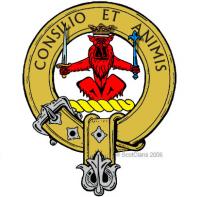
Clan Maitland
Clan Maitland People
Sir Richard Maitland, Lord Lethington (1496 - 1586)
Scottish poet, father of William Maitland of Lethington, Secretary of State to Mary I of Scotland.
In his later years he was blind, and occupied himself in composing a History of the House of Seaton, and by writing poems, e.g., On the New Year, On the Queene's Maryage, etc. He held various offices, chiefly legal, but appears to have kept as far as possible out of the fierce political struggles of his time, and to have been a genially satirical humorist.
William Maitland (1525-1573)
Scottish politician and reformer. He was son to the poet Richard Maitland. William was the Secretary Lethington to Mary I of Scotland. He played a prominent part in the various movements of his time, but gained the confidence of no party. He adhered to the party of James Stewart, 1st Earl of Moray, illegitimate half-brother of the Queen regnant, against the extreme measures of John Knox
Maitland proved a highly astute ambassador at the Court of Elizabeth I of England. He connived at the murder of David Rizzio, private secretary and rumoured lover of Queen Mary, by her King consort Henry Stuart, Lord Darnley and his supporters. He managed to regain her favour though.
When Mary fled to England in 1567, Maitland joined with the new government but acted in her interest and formed a party to restore her to power. He and Kirkcaldy of Grange were forced to surrender, however, at Edinburgh in 1573. Maitland afterwards died in Leith prison.
John Maitland, 1st Duke of Lauderdale (1616 - 1682)
Scottish politician, and leader within the Cabal Ministry. Maitland began public life as a zealous adherent of the Presbyterian cause, took theCovenant, sat as an elder in the General Assembly of the Church of Scotland, and was sent to England as a Commissioner for the Covenant to attend the Westminster Assembly.
In February 1644 he was a member of the Privy Council of England and the Privy Council of Scotland, and on November 20 was one of the Commissioners appointed to persuade King Charles I to agree to the establishment of Presbyterianism. In 1645 he advised Charles to reject the proposals of the Independents, and in 1647 approved of the king's surrender to the Scots. He persuaded him later to accept the invitation to Scotland from the Argyll faction, accompanied him thither in 1650 and in the expedition into England, and was taken prisoner at Worcester in 1651, remaining in confinement till March 1660.
He was a member of the Cabal Ministry, but took little part in English affairs, he was created Duke of Lauderdale and Earl of March, and on June 3 Knight of the Garter. He was also appointed Lord President of the Privy Council of Scotland in 1672, a position he held until 1681.
In 1673, on the resignation of James in consequence of the Test Act, he was appointed a Lord Commissioners of the Admiralty.On the 25th of June 1674 he was created Earl of Guilford and Baron Petersham in the Peerage of England. In Scotland, which he visited immediately after this victory in the Parliament of England, he overbore all opposition to the king's demands for money. Another address for his removal from the Commons in England was suppressed by the dissolution of parliament on May 26, 1679, and a renewed attack upon him, by the Scottish party and Shaftesbury's faction combined, also failed.
In 1680, however, failing health obliged Lauderdale to resign the place and power for which he had so long successfully struggled. His vote given for the execution of Lord Stafford on November 29 is said also to have incurred the displeasure of James. In 1682 he was stripped of all his offices, and he died in August.
 James Maitland, 8th Earl of Lauderdale (1759-1839)
James Maitland, 8th Earl of Lauderdale (1759-1839)
Scottish politician and writer. He was a member of parliament from 1780 until 1789 when he succeeded his father in the earldom. In the House of Commons he took an active part in debate, and in the House of Lords, where he was a representative peer for Scotland, he was prominent as an opponent of the policy of Pitt and the English government with regard to France, a country he had visited in 1792, in the company of John Moore. In 1806 he was made a peer of the United Kingdom as Baron Lauderdale of Thirlestane and for a short time he was keeper of the Great Seal of Scotland. By this time the earl, who had helped to found the Society of the Friends of the People in 1792, had somewhat modified his political views; this process was continued, and after acting as the leader of the Whigs in Scotland, Lauderdale became a Tory and voted against the Reform Bill of 1832.
He wrote an Inquiry into the Nature and Origin of Public Wealth (1804 and 1819), a work which has been translated into French and Italian and which produced a controversy between the author and Lord Brougham; The Depreciation of the Paper-currency of Great Britain Proved (1812); and other writings of a similar nature.




